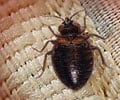The day when restaurants will serve garlic grasshoppers or beetle larva skewers is getting closer in Costa Rica, where scientists are growing insects for human consumption.
The day when restaurants will serve garlic grasshoppers or beetle larva skewers is getting closer in Costa Rica, where scientists are "growing" insects for human consumption.
Entomologist Manuel Zumbado's research into this alternative food source is inspired by practices in Africa, where insects have long been part of people's diet.With its rainforests playing host to countless insect species, including thousands that have yet to be identified, Costa Rica is a perfect breeding ground for the work.
From leaf-cutting ants to rhinoceros beetles and a dizzying flurry of butterflies, the Central American nation is also a haven of ecotourism. But is it the next hotbed of mouth-watering bugs?
The food diversification program at the National Biodiversity Institute in Santo Domingo de Heredia, a small city close to the capital San Jose, looks into indigenous insect species.
But it also examines mushrooms, inspired by their importance in diets from the Himalayan kingdom of Bhutan.
At the institute, Costa Rican scientists mingle with Bhutan mycology expert Ugyen Yangchen and Elisabeth Zannou, an entomologist from Benin.
Advertisement
"Benin knows a lot about insect consumption and Bhutan about eating mushrooms, while Costa Rica is bringing its experience in managing biodiversity," Marianella Feoli, who manages the foundation coordinating the research program, told AFP.
Advertisement
"In other countries, gourmet restaurants serve insects," he noted.
"In the beginning, people thought we were a bit crazy, but I think this is an alternative, not only as a survival food, but also as a cultural concept."
Esperanzas, a large grasshopper species with long antennae that abound in Costa Rica's forests and rural areas are "far more savory than shrimp" when seasoned with garlic, according to the researcher. Zumbado should know -- he has consumed scores of insects during his travels in Costa Rica and Benin.
"It's worth the effort to taste them," he added.
"You can fry them, grill them on skewers with onions."
Insects a la fish were a favorite of Benin locals.
As part of his effort to convince a skeptical public not particularly enthused at the thought of munching on crunchy creepy crawlies, the entomologist suggested first adding insect delicacies to the menus of the best restaurants in town.
A boutique hotel in the northern province of Guanacaste -- the country's top tourist destination -- was tempted, an accompanying wine oblige.
"I would recommend a big pricetag for the entree, so that clients appreciate it," Zumbado said with a malicious smile.
Source-AFP
TAN









